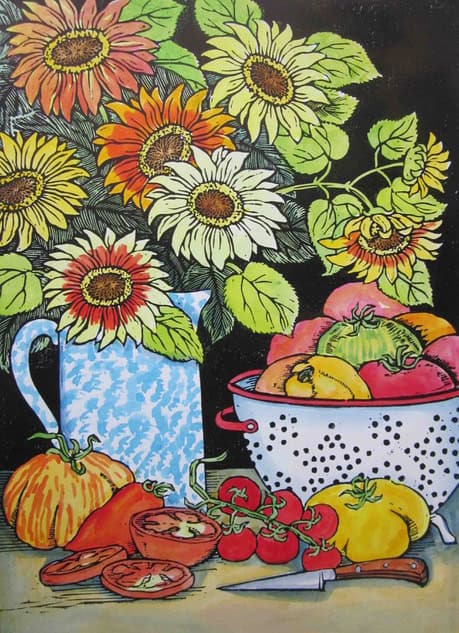 Frank Morton: Wild Garden Seed Catalog: Plant Breeder
Frank Morton: Wild Garden Seed Catalog: Plant Breeder
Growing and buying local seeds has exploded, and there are now small farm-based seed companies from almost every state. It is a good sign that the alternative seed community has taken its own fate in its hands and bringing seeds back to be more regional, but also accessible for everyone. These growers are not just growing their own seeds, but creating their own varieties. They have picked up what is pertinent for selection, to fit altitude and latitude, as well as collecting fruits and vegetables when traveling the globe, just to get the seeds.
Much of this new revolution in the seed industry is thanks to Frank Morton, seed breeder, collector, and owner of Wild Garden Seeds in Philomath, Oregon. He began growing salad greens for local restaurants, then branched off to grow plants to collect the seeds, developing some of his own open-pollinated seed specialties for a range of both vegetables and flowers. Then he taught others. In 2002, he was on the lecture circuit, showing people how to grow, harvest, and clean seeds, and how it is gathering into the production cycle so farmers could both grow crops and seeds.
The result is that more specialty seed growers are popping up around the country, and Canada, with similarities to the brewing industry. It started with just a few and now they are everywhere, and they won’t all make it. Some just are not in a suitable location to be a seed growing company, but it is building awareness around the seed industry, and the notion that we can be more self-sufficient.
How did you come to start the seed catalog?
Frank Morton: I often lean towards ideas until the plan is in place, and the concept of raising seeds was always something that I thought would integrate into my market garden business but was not sure how. It ultimately was a self-sufficient impulse, because there were varieties that only we had because I had been quietly breeding and seed collecting for decades.
We had explored all the ways to grow salad greens, and it was clearly time to stop growing salad greens and start growing seeds. Then I taught others how to grow seeds, to expand their knowledge as well, so more small farmers could save and sell seeds. What has emerged are small farm-based seed businesses in almost every state.
Why did you feel this was important, to teach others?
Frank Morton: I am not sure, but just felt it was important that others knew how to develop seeds and start more locally-grown seed businesses. By teaching others, I was essentially selling tickets to my competition. We noticed the competition, and it had some impact, but it is exactly what we wanted to happen. Commercial seed growers are the production contractors for seed breeding companies, and they keep secrets. In the organic community, we all share information, and we know the only way to make progress.
Your primary focus has been on salad greens, why did you start to offer flowers?
Frank Morton: We noticed a trend, especially among women farmers, who were growing cut flowers. At the farm conferences, there are many flower workshops, and it was full of people in their early 20 and 30s. I had grown calendula and poppies, but wanted to figure out other flowers that I could grow, and went wild to grow everything. Cleaning flower seeds can be much harder because they are different shapes, sizes and require conditioning. I felt I needed to learn those things and offer what strikes my fancy and will breed where there are holes in the market, finding out what people want that the market is not supplying.
What are your favorite greens from Wild Garden Seeds?
Frank Morton:
Upland Cress: An underrated and little-known salad green, which grows year-round. It is similar to watercress but more toothsome and spicier than arugula.
Joker Lettuce: A crisp leaf lettuce, splashed with red, it is juicy and sweet.
Avalon Blue Kale: Bred by Hank on our farm, is a dazzling blue. I also like White Russian kale and Red Herzog kale for salads.
Castelfranco and Red Treviso Chicory: It’s finally becoming trendy to grow chicory, and a range of chicories are coming into the chef’s repertoire.
Chervil: The aroma alone makes me salivate when it is in the salad bowl. I love the mild anise and soft texture and aroma.
Raab: The word means the floral shoot of a brassica or turnip, and the Raab of Mustard and Chinese cabbage are colorful and sweet, with floral aromas.
Quinoa greens: Most gardeners can grow for grains, but the young leaves are like lamb’s quarters- salty, thick can tolerate hot weather spinach. Let it grow taller, and snap the shoot off when it is a foot tall, harvesting the stem and leaf together, break off like asparagus.
Excerpted from The New Heirloom Garden book. (Rodale 2021)
To learn more, visit Wild Garden Seeds
To read more about Frank Morton, visit High Mowing Seeds Blog:


